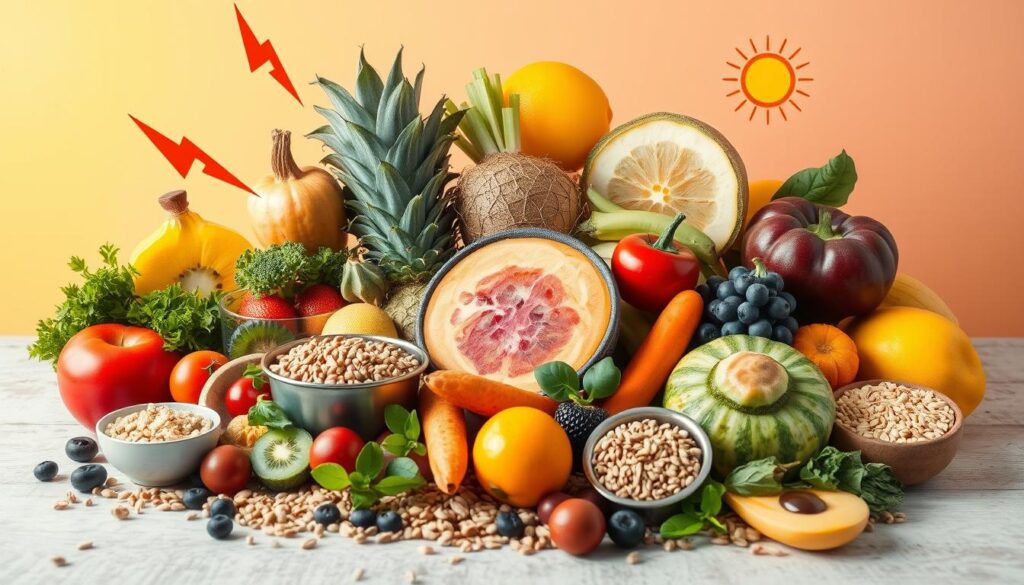Have you ever reflected on how your food choices shape not just your body but your entire well-being? In a world bustling with convenience and fast-paced lifestyles, it’s easy to overlook the profound impact that nutrition can have on your everyday life. When I realized the connection between what I ate and how I felt—not just physically but emotionally—I knew it was time to make a change. Nutrition is not just a matter of dieting; it’s about fostering a healthy diet that fuels your body and nourishes your spirit.
Imagine waking up each day feeling energized and ready to tackle whatever comes your way. This guide is designed to equip you with practical tips and insights that empower you to make informed food choices. By following effective dietary guidelines and prioritizing balanced nutrition, you can create meals that support your wellness journey and enhance your quality of life. It’s time to unlock the potential within nutrition and transform how you feel every single day.
Key Takeaways
- Nutrition is key to maintaining not just your physical health but also your emotional well-being.
- Making mindful food choices can lead to enhanced energy levels and improved mood.
- Incorporating a variety of fruits and vegetables encourages healthier eating habits.
- Balancing macronutrients and micronutrients is essential for overall health.
- Budget-friendly nutrition choices can align with your health goals.
- Building positive eating habits early can lead to lifelong health benefits.
What is Nutrition and Why It Matters
Nutrition is the study of how food affects your body, encompassing the processes through which food is transformed into energy and essential components for growth and repair. Understanding nutrition is vital for adopting a healthy diet that promotes overall health and wellness.
Definition of Nutrition
Nutrition involves the intake, absorption, and utilization of nutrients from food. It plays a crucial role in supporting bodily functions, immune response, and maintaining energy levels. A well-balanced diet consists of various food groups, ensuring you receive all necessary nutrients to thrive.
Importance for Overall Health
Investing in proper nutrition substantially contributes to overall health. Research indicates that more than half of U.S. adults, about 129 million people, suffer from one or more preventable chronic diseases linked to diet and physical activity. Consuming a healthy diet rich in fruits, vegetables, whole grains, and lean proteins can help maintain a healthy weight, prevent chronic diseases, and improve longevity.
Nutrition’s Role in Disease Prevention
A nutrient-rich diet plays a vital part in disease prevention. Insufficient nutrition levels can lead to various health issues, while adequate intake of vitamins and minerals strengthens the immune system. Studies show that following plant-based diets may reduce the risk of chronic illnesses, including heart disease and cancer, by as much as 40%. By prioritizing nutrition, you can actively work towards minimizing health risks and enhancing your overall quality of life.
| Nutrition Impact | Chronic Disease | Preventable Conditions |
|---|---|---|
| Healthy Diet | Heart Disease | 129 million U.S. adults affected |
| Nutrient-Rich Foods | Diabetes | Prevention through diet |
| Plant-Based Lifestyle | Cancer | Risk reduction by up to 40% |
| Balanced Nutrition | Osteoporosis | Effect on elderly health |
Understanding Nutrients: The Basics
Grasping the basics of nutrients is essential for understanding how they impact your health. Nutrients are broadly classified into macronutrients and micronutrients, each serving unique and vital roles in bodily functions. Recognizing the importance of these nutrients can help you make informed decisions about your diet.
Macronutrients: Carbs, Proteins, and Fats
Macronutrients are needed in larger amounts and include carbohydrates, proteins, and fats. They play a significant role in providing energy and supporting overall bodily functions.
- Carbohydrates: These are the body’s primary energy source. They can be classified into simple carbohydrates, which are quickly digested, and complex carbohydrates, which take longer to break down. Popular sources include grains, fruits, vegetables, and beans.
- Proteins: Composed of amino acids, proteins are vital for building and repairing tissues. Healthy protein sources include meat, fish, legumes, eggs, dairy, nuts, and seeds.
- Fats: Comprised of fatty acids, fats are crucial for energy reserves and cellular functions. Sources of healthy fats include avocados, olive oil, and fatty fish. Fats are further categorized into saturated, unsaturated, and trans fats, with saturated fats mainly found in animal products and unsaturated fats predominating in plant sources.
Micronutrients: Vitamins and Minerals
While macronutrients are consumed in larger quantities, micronutrients are required in tiny amounts but are equally important. Vitamins are organic substances essential for numerous bodily functions, while minerals come from soil and water and are vital for various physiological processes.
- Vitamins: Essential vitamins include A, C, D, E, K, and the B-complex vitamins.
- Minerals: Key minerals encompass calcium, phosphorus, potassium, sodium, and magnesium, as well as trace elements like iron, zinc, and selenium.
Water’s Essential Role
Water often gets overlooked, but it is classified as a macronutrient due to the significant quantities your body requires to function effectively. Adequate hydration, approximately 2 liters or 8 glasses of water daily, supports digestion, circulation, and temperature regulation. Maintaining proper hydration is as essential to nutrition as consuming the right foods.

| Nutrient Type | Examples | Function |
|---|---|---|
| Macronutrient | Carbohydrates, Proteins, Fats | Energy production, cell repair, hormone regulation |
| Micronutrient | Vitamins, Minerals | Support immune function, bone health, nerve function |
| Water | N/A | Maintains hydration, aids digestion, regulates body temperature |
Building a Balanced Diet
A balanced diet plays a crucial role in maintaining optimal health. Utilizing the plate method can simplify your journey towards healthy eating. This method encourages you to visualize your meals, making it easier to maintain proper portion sizes and variety.
The Plate Method Explained
The plate method is a simple visual guide for portion control. Aim to fill half of your plate with vegetables and fruits, which should include at least five portions daily. One quarter of your plate should consist of whole grains, such as brown rice or whole wheat. The remaining quarter should feature lean proteins, like fish, poultry, beans, and nuts. This balanced approach ensures you receive a broad spectrum of nutrients essential for your well-being.
Importance of Variety
Diversity in your food choices is vital for a balanced diet. Incorporating a range of fruits, vegetables, whole grains, and protein sources allows your body to absorb a wide array of vitamins and minerals. Be mindful that starchy foods should represent just over a third of your daily intake, while limiting dairy to 1-2 servings a day. Remember, potatoes do not count as a vegetable in this method, as their impact on blood sugar levels can be concerning.
Tips for Meal Planning
Effective meal planning can alleviate the challenge of making last-minute food choices that could derail your healthy eating goals. Allocate time each week to outline your meals and shopping list. Focus on including the recommended foods and varieties from the plate method, while also keeping your meals interesting. Limit sugary drinks, aiming instead for water and unsweetened options, and consider your fluid intake, aiming for at least 6 to 8 glasses each day.

The Impact of Nutrition on Energy Levels
Your energy levels are closely linked to the nutrition you receive. What you eat can significantly affect your overall vitality and productivity throughout the day. A focus on balanced, nutritious food choices helps maintain steady energy, rather than experiencing highs and lows brought on by unhealthy snacks or refined sugars.
How Food Affects Your Energy
Understanding how different foods impact your energy is crucial for maintaining a healthy diet. Complex carbohydrates, such as whole grains, offer a steady energy supply due to their fiber content, which promotes slower digestion. This helps stabilize blood sugar levels and prevents energy spikes and crashes associated with refined carbs. Additionally, incorporating protein sources into meals, like eggs or lean meats, enhances satiety and assists in sustaining energy due to their longer digestion time.
Foods that Boost Energy
Several foods are particularly effective at boosting your energy levels, including:
- Leafy greens – Packed with iron, which is essential for preventing fatigue.
- Legumes – Beans and lentils are excellent sources of protein and fiber, ensuring long-lasting energy.
- Whole grains – Foods such as brown rice and oatmeal provide complex carbohydrates that fuel your body effectively.
- Fruits – Bananas and berries deliver vitamins and antioxidants that are key in promoting energy release.
- Nuts – Rich in healthy fats and proteins, they serve as a great snack to maintain energy levels in between meals.
Timing of Meals and Snacks
Meal timing is another critical aspect of energy management. Consuming meals and snacks every three to four hours can help stabilize your energy levels throughout the day. A well-balanced breakfast, especially one high in protein, has proven beneficial in curbing cravings and preventing energy slumps later. Remember to hydrate sufficiently by drinking 6 to 8 cups of water daily, as hydration directly impacts your energy levels.

| Type of Food | Benefits for Energy Levels | Examples |
|---|---|---|
| Complex Carbohydrates | Provides steady energy and stabilizes blood sugar | Brown rice, whole grain bread |
| Proteins | Promotes satiety and sustainable energy | Eggs, chicken, legumes |
| Iron-rich Foods | Helps combat fatigue | Red meat, spinach, lentils |
| Hydrating Foods | Supports hydration and energy levels | Cucumbers, watermelon, strawberries |
Decoding Food Labels: A Guide
Understanding food labels is vital for making informed dietary choices. Nutrition facts provide essential details about the food you consume, allowing you to monitor your intake effectively. Recognizing added sugars in products helps identify potentially unhealthy ingredients that may compromise your wellness. Your goal should be to select foods rich in healthy ingredients while minimizing consumption of those filled with empty calories.
Understanding Nutrition Facts
The Nutrition Facts label was mandated under the Nutrition Labeling and Education Act of 1990. The most recent updates to food labels came in 2016, ensuring that serving sizes reflect realistic amounts consumers typically eat. For instance, a small bag of trail mix may contain a total of 300 calories, although it only lists 100 calories per serving.
Identifying Added Sugars
Distinguishing between total sugars and added sugars is crucial. Foods high in added sugars have been linked to various health issues, such as obesity and diabetes. For example, while plain dairy milk provides 12 grams of naturally occurring sugars per cup, a cup of strawberry yogurt can contain 20 grams of sugars, with 10 grams classified as added sugars. Understanding these distinctions empowers you to make healthier food choices.
Recognizing Healthy Ingredients
Ingredients on food labels are organized by weight, so you should look for healthier options by checking the first few items on the list. Ideally, select foods where the first ingredients are whole grains, fruits, or vegetables. Aim to avoid highly processed items that often include artificial additives. Recognizing labels that claim to have “no added sugars” or “high in essential nutrients” can significantly guide you toward better health.
| Nutrient | Value in 1 Serving (280 calories) | Value in 2 Servings (560 calories) |
|---|---|---|
| Total Fat | 9g (12% DV) | 18g (24% DV) |
| Saturated Fat | 4.5g (23% DV) | 9g (46% DV) |
| Cholesterol | 35mg (12% DV) | 70mg (24% DV) |
| Sodium | 850mg (37% DV) | 1700mg (74% DV) |
| Total Carbohydrate | 34g (12% DV) | 68g (24% DV) |
| Dietary Fiber | 4g (14% DV) | 8g (29% DV) |
| Total Sugars | 6g | 12g |
| Protein | 15g | 30g |
| Calcium | 320mg (25% DV) | 640mg (50% DV) |
| Iron | 1.6mg (8% DV) | 3.2mg (20% DV) |
| Potassium | 510mg (10% DV) | 1020mg (20% DV) |

Special Dietary Needs: What to Consider
Meeting special dietary needs is essential for ensuring good health and well-being. Different populations have unique nutritional requirements that must be met to maintain optimal health. This section explores the nutritional considerations for vegetarians and vegans, those with gluten intolerance, and pregnant women.
Nutrition for Vegetarians and Vegans
Vegetarian and vegan diets can be highly nutritious when properly planned. It is crucial for individuals following these diets to ensure they receive adequate protein, iron, and B12. Options include:
- Legumes: Lentils, chickpeas, and beans are excellent protein sources.
- Nuts and Seeds: Almonds, chia seeds, and pumpkin seeds provide healthy fats and protein.
- Fortified Foods: Some plant-based milks and cereals are fortified with B12.
Gluten-Free Diets
For those with gluten-related disorders, such as celiac disease, adhering to a gluten-free diet is vital. This means avoiding foods made from wheat, barley, and rye. Common gluten-free alternatives include:
- Rice and Corn: Versatile grains safe for consumption.
- Quinoa: A complete protein packed with nutrients.
- Gluten-Free Flours: Almond flour and coconut flour serve as baking substitutes.
Nutritional Needs for Pregnant Women
Pregnancy nutrition is a significant aspect of ensuring the development of a healthy baby. Pregnant women should pay attention to specific vitamins and nutrients, including:
- Folic Acid: Essential for preventing neural tube defects.
- Iron: Supports increased blood volume and prevents anemia.
- Calcium: Vital for developing strong bones in the fetus.

| Diet Type | Key Nutritional Considerations |
|---|---|
| Vegetarian | Ensure proteins, iron, and B12 from plant sources. |
| Vegan | Focus on fortified foods and alternative sources of essential nutrients. |
| Gluten-Free | Avoid gluten-containing grains and choose safe alternatives. |
| Pregnancy | Monitor intake of folic acid, iron, and calcium for optimal fetal health. |
The Role of Supplements in Nutrition
In today’s fast-paced world, it can be challenging to obtain all the necessary nutrients solely through food. Supplements can serve as an essential addition to your nutrition regimen, especially when dietary intake is insufficient. Before considering supplements, awareness of when they may be needed is crucial.
When to Consider Supplements
You might think about supplements if:
- Your diet lacks variety or is restrictive, such as a vegetarian or vegan diet.
- You have specific health conditions or dietary restrictions that affect nutrient absorption.
- Your healthcare provider recommends them for particular health reasons.
Popular Supplement Types
Many supplements can help fill in nutritional gaps. Common options include:
- Multivitamins: These provide a broad spectrum of vitamins and minerals.
- Vitamin D: Supports bone health and immune function.
- Omega-3 fatty acids: Benefit heart health and cognitive function.
- Calcium: Important for maintaining strong bones.

Risks and Benefits of Supplementing
While supplements can enhance your nutrition, they are not without risks. Potential side effects can arise, especially when taken in excessive amounts or combined with medications. For instance, vitamin K may interfere with blood clotting medications, while excessive vitamin A can lead to serious health issues. Consulting with a healthcare professional ensures that your supplementation aligns with your unique nutritional needs. Remember, the best approach to nutrition is a balanced diet rich in whole foods.
Mindful Eating: Strategies for Success
Mindful eating is a transformative approach that encourages you to be fully present during your meals. This practice involves savoring each bite and recognizing your hunger cues, enabling a deeper understanding of your relationship with food. Integrating mindful eating into your daily nutrition can significantly enhance your healthy habits and overall well-being.
What is Mindful Eating?
Mindful eating focuses on being aware of the sensations and experiences associated with eating. This strategy promotes a greater connection between mind and body, allowing you to appreciate flavors, textures, and the overall experience of meals. By being attuned to what, when, and why you eat, you can cultivate healthier eating patterns and improve your relationship with food.
Tips for Practicing Mindfulness
- Eliminate distractions like phones or televisions during meals.
- Slow down your eating pace to allow better recognition of fullness signals.
- Focus on the flavors and textures of your food as you eat.
- Recognize emotional triggers that lead to eating and explore those feelings without judgment.
- Practice gratitude for the nourishment provided by your meals.
Benefits of Mindful Eating
Engaging in mindful eating offers numerous benefits that extend beyond just enjoying your food. Research shows that this practice can lead to:
| Benefit | Description |
|---|---|
| Improved Eating Behaviors | Mindful eating helps manage portions and recognize hunger cues, resulting in better control over eating habits. |
| Decreased Emotional Eating | This practice encourages awareness of emotional triggers and leads to healthier responses to cravings. |
| Enhanced Satisfaction | Savoring food can increase meal satisfaction and contribute to healthier food choices. |
| Better Digestion | Eating slowly allows for improved digestion and recognition of fullness, preventing overeating. |
| Support for Chronic Conditions | Mindful eating has shown to help manage conditions such as obesity and diabetes, improving overall health outcomes. |

Common Nutrition Myths Debunked
Navigating the world of nutrition can be challenging, especially with the plethora of misinformation available. Understanding common nutrition myths helps you make informed choices and foster healthier eating habits.
Myth: Carbs are Bad
A prevalent misconception is that all carbohydrates are harmful. In reality, carbohydrates are essential for supplying energy. Consuming whole grains, fruits, and vegetables offers vital fiber and nutrients, supporting overall health. The Dietary Guidelines for Americans 2020–2025 recommend making at least half of your grain intake whole grains, which can help reduce the risk of chronic diseases.
Myth: Fats Make You Fat
Another common belief is that fats should be avoided at all costs. Healthy fats, such as those in avocados, nuts, and olive oil, are crucial for numerous bodily functions and do not directly cause weight gain when consumed in moderation. It’s advised to limit saturated fats to less than 10 percent of your daily caloric intake for optimal health while ensuring to incorporate fat-free or low-fat dairy products into your diet.
Myth: Detox Diets are Necessary
The claim that detox diets are essential for cleansing the body is another nutrition myth worth addressing. Your body possesses a natural detoxification system, primarily through the liver and kidneys. These organs efficiently eliminate toxins without the need for extreme diets. Instead of focusing on detoxing, prioritize a balanced diet rich in whole foods, fruits, and vegetables to support your body’s innate functions.

| Nutrition Myth | Fact |
|---|---|
| Carbs are Bad | Essential for energy; focus on whole grains |
| Fats Make You Fat | Healthy fats are necessary; moderation is key |
| Detox Diets are Necessary | The body detoxifies naturally; no extreme diets needed |
Taking Action: Implementing Nutrition Tips
Embarking on a path to better nutrition begins with setting realistic goals that fit seamlessly into your daily routine. Whether it’s incorporating more fruits and vegetables or reducing added sugars in your diet, these attainable objectives will help build your confidence and lay the groundwork for sustainable changes. As you progress, consider tracking your dietary habits and discovering how they correlate with your physical activities, such as running. This holistic approach not only enhances your nutrition but also contributes to preventing common running injuries, ensuring that your body receives the necessary fuel and nutrients for optimal performance. Remember, each small change you make can have a significant impact on your overall health and fitness journey.
Setting Realistic Goals
As you establish your nutritional goals, consider what aligns best with your lifestyle and preferences. For instance, if you’re working towards a personalized nutrition plan, start by tracking your current eating habits and gradually introduce healthier options. This tailored approach will ensure that your goals are specific, measurable, achievable, and relevant to your health aspirations.
Creating Your Personalized Nutrition Plan
A solid nutrition plan should incorporate a variety of food groups while addressing critical nutrients such as calcium, potassium, and dietary fiber. Keep in mind that staying motivated is essential; tracking your progress and celebrating small milestones can significantly enhance your engagement. Share your journey with supportive friends, family, or even a dietitian, as having accountability is crucial to maintain your commitment to healthier eating.
Staying Motivated and Accountable
The journey to improved nutrition is a continuous process. By allowing yourself moments of enjoyment and flexibility, you’ll find it easier to adhere to your personalized plan. Remember that meals are opportunities to nourish your body and experience flavors without guilt. With the right mindset and support, you’re well-equipped to tackle your nutrition tips and transform your health!









